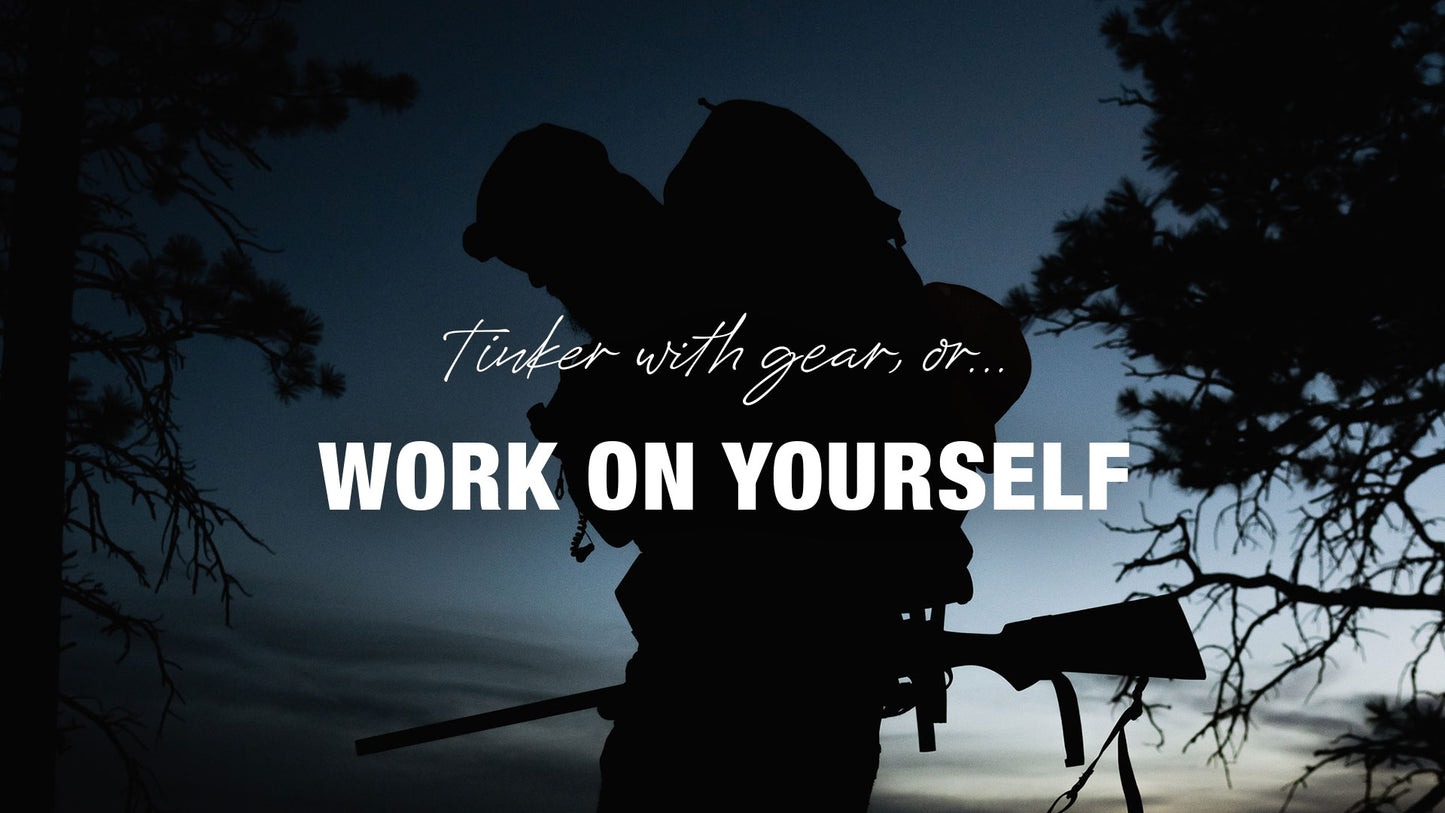
Setting goals and achieving them. It's a beautiful thing and acts as a driving force throughout our day-to-day lives.
For hunters, it is about finding ways to cut down the barrier that stands between us and success in the field. Oftentimes, hunters turn to gear as a tool to help them achieve their goals more consistently.
I absolutely love gear. I love talking about it, testing it, and the confidence it gives me in the field. However, I would be lying if I said that gear was the most critical factor in many of my successful hunts.
Good gear helps a good hunter, but gear doesn't make a successful hunter.
Aside from gear, let's look at a few things that have helped me immensely in the tag-filling department.

HUMILITY & HELP
We learn from those that are better than us. If you want to learn how to cook, seeking the advice of an executive chef is a great place to start. They can help build you a solid foundation to stand on. Shooting a bow or rifle, for instance, is no exception to this. Sure, you can learn quite a bit on your own, but you can also do quite a bit wrong and not even know it. This is how bad habits like Target Panic are often formed and where a coach can help elevate your performance.
In a community where do-it-yourself pride runs deep, I get that bending the knee and taking advice from someone may feel a little bitter at times. But, by doing so you're not only doing yourself a favor, you're doing the animal a favor. A coaching class will make you more accurate, it'll help you understand your weapon better, and it'll inevitably make you more lethal. We invest a lot of money into gear, but very few seem to invest in their capability with that gear.
This can also span past shooting a weapon and even into hunting know-how. While it's not as structured of an approach (buying coaching classes), choosing to place yourself under a hunting mentor of some sorts will pay off big time. It's one thing to read how something is done; it's quite another seeing the process in person and being part of it.
READING THE SIGNS
If you look back to hunters way before our time, they didn't have fancy optics and digital mapping to help with locating game animals. All that they had was between their ears. They looked for signs of the animals they were hunting, read them like a book, then pursued them accordingly.

Beneath the surface, our wild landscapes tell a story of the local fauna. Animal tracks, rub lines, flipped rocks, busted up logs, beds, scat, hair, wallows, sheds, etc. It all tells a story. There's no guessing if animals were there or not. They 100% were. Each animal is a little different and may provide different kinds of sign, but tracks, scats, and beds are a constant with all animals. Learn what that stuff looks like. Know how to interpret the age of the sign. Pay attention to the broader context of where you're seeing it. And learn about the particular species of animal you're hunting.

There is a lot of sign that flies under the radar too. Take black bears for instance. They are notorious for flipping rocks over and busting up logs in the name of snagging a bite to eat. These are things that are easily overlooked. Another one is oak brush in the Fall. It can often be observed to see if deer have been picking the acorns clean. This is all really simple stuff, but it's stuff that you can bank on way past whatever a screen is telling you.
PHYSICAL CAPABILITY
Aside from the gear we buy, the most valuable piece of functional "gear" that we have is our bodies. If you think about it, our physical capability is what makes this all possible. Our bodies are what brings us into the field, makes good shots, keeps us safe, and packs meat back to the vehicle. Without a well-tuned body, this whole thing doesn't work.

Everyone will have a different type of fitness routine and that's totally fine. I'm not going to sit here and tell you what's best for you. What I will say is this: you need endurance and the ability to carry a heavy pack. With that in mind, go forth and do something in the name of those things to prepare yourself. Maybe it's trail running and weighted pack hikes. Maybe it's Crossfit. Just do something that will help your physical capability and you'll be that much more prepared for the hunt. Remember, gear costs money. Fitness costs sweat.
An Example Week of My Training
You don't have to go crazy here. If you want to hit it every day, then, by all means, go for it. If just 3 times a week is what you can do, that is enough to make a big difference. Whatever your time situation is, make it happen.
- Monday — 1 hour Trail Run
- Tuesday — 1 hour Strength Training(weight lifting, calisthenics)
- Wednesday — 1 hour Trail Run
- Thursday — Rest or Active Recovery
- Friday — 1 hour Weighted Pack Hike
- Saturday — Rest or Active Recovery
- Sunday — Rest
MENTAL HEALTH
No matter how strong the body is, if the mind is broken, it's over. A broken mind will not fuel a fit body. I'm not just talking about tough hunting conditions at play here either. I'm mostly referring to having things in order back home. Whether it's the stress of work or missing your family and feeling guilty for being gone. We need to be "right" upstairs in order to be in-the-moment and hunting our best. Gear cannot fix a weak or broken mindset.

One of the best ways to strengthen the mind is to willingly engage in difficult things. To stick to doing what you "need" or "should" do, even when you don't "want" to. It's really easy to say, "Ah, I'll just run tomorrow." Right there, nip that up and lace your shoes. Saying "yes" to things is much harder than saying "no." This will translate well in the backcountry because you will definitely have to do things you don't necessarily want to do back there.
Another portion of the mental side of things is trying to cut away any foreseeable stress you can think of. Things like work and family life. On the work front, make for darn certain you're ahead of the game, or at least caught up with things beforehand. You want to actually clock out when it's time to hunt. And for the fam, try dedicating a few days to just being with them before leaving. Be present. Take care of any honey-dos too. Try to make life easier for them when you're gone. I soak up the quality time and tackle the chores before leaving.
FINAL THOUGHTS

Quality gear no doubt makes a difference out there. It makes us more comfortable, provides ultimate confidence, and can make us more efficient. Ultimately though, we are the ones at the helm. It is our decisions that create a path to follow. And it's our ability as a whole, along with our mental fortitude that will create results. Tinker with gear, sure. But don't neglect working on yourself.
Josh Kirchner is the author of the book, Becoming a Backpack Hunter, as well as the voice behind Dialed in Hunter, a blog that not only documents his own journey, but provides gear reviews, tips/tactics for western hunting, and encourages other hunters to chase and achieve their goals. Josh is a passionate bowhunter that has been hunting with his family since he was a small boy. When he is not chasing elk, deer, bear, and javelina through the diverse Arizona terrain, he is spending time with his wife, daughter, and two herding dogs.
